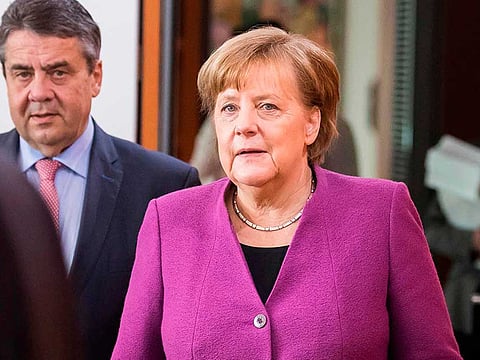Germany not ready for a gender-neutral anthem
No more ‘Fatherland’ as a fierce debate rages on in Germany about changes in the national anthem, Deutschlandlied, written in 1841 to Joseph Haydn’s earlier hymn to Holy Roman Emperor Francis II

National anthems are meant to make everyone feel included, which is why Austria and Canada tweaked parts excluding women. But some lines between tradition and modern society are harder to cross than others. Not all countries are ready to take the gender-neutral plunge, fearing the political risks too great in an era of bitterly divided politics.
Last week, Kristin Rose-Moehring, the German Family Ministry official responsible for gender equality, proposed two changes to the lyrics of the national anthem — the last remaining verse of August Heinrich Hoffman von Fallersleben’s Deutschlandlied, written in 1841 to Joseph Haydn’s earlier hymn to Holy Roman Emperor Francis II.
Germans have used the combination of lyrics and music since 1922, and they’ve had to change the words more than once as they made history and then tried to come to terms with it. The first verse, which put “Germany, Germany above all,” was the only one used by the Nazis. It fell away because of its specific, outdated territorial claims. The second verse, glorifying “German women, German loyalty, German wine and German song,” seemed like a bad place to start the anthem. So, since 1991, only the third verse, focusing on “unity, right and freedom”, has been sung and protected by law. In those 10 lines, Rose-Moehring suggested replacing Vaterland (Fatherland) with Heimatland (homeland) and bruederlich (brotherly) with couragiert (mettlesome), which would obviously change the meaning while maintaining the meter. It’s as easy to sing as the current version, and in any case, it’s Haydn’s music that’s the masterpiece, not Hoffman’s somewhat naive text that has already been mostly discarded.
Germany’s neighbour, Austria, gender-neutralised its anthem in 2012, replacing “home to great sons” with “home to great daughters and sons” and “fraternal choirs” with “jubilant choirs” but keeping the word “Fatherland” because there’s no full equivalent. “Homeland” doesn’t convey the idea that this is the country of one’s ancestors. Legislators went for it even though the new text doesn’t fit the song’s meter.
In January, Canada’s senators voted to change “true patriot love in all thy son’s command” to “in all of us command”, and last month, it received the assent of the UK’s Queen Elizabeth, Canada’s nominal head of state.
These decisions are made by countries recognising that it’s no longer a man’s world. Even older men have the sense to understand it. As Stuart Lindop, a Canadian World War veteran, wrote to his member of parliament, “My motivation was not based on prissy political correctness but rather to see that women, who had earned the right to be recognised, were not implicitly excluded.”
National traditions
But then, both Canada’s and Austria’s anthems were adopted relatively recently, in 1980 and 1946, respectively. They are linked to national traditions — Austria’s is sung to a melody once attributed to Mozart, and Canada’s is a 19th-century song — but their symbolic meaning is relatively new. That’s not the case everywhere.
It would be much harder to imagine editing the first line of the Italian anthem, Goffredo Mameli’s Brothers of Italy. The song is, after all, sometimes known by that name. One could drop its next-to-last verse referring to male heroes, but it wouldn’t change the song’s general warlike tenor.
Nor is there a good way to change the first verse of the Marseillaise, the national anthem of France, where it refers to the enemy coming to “cut the throats of your sons”. The first line’s mention of la Patrie, or Fatherland, is obviously problematic.
By the same token, there would be a fierce political split in the US over changing the mention of “freeman” in The Star-Spangled Banner: “O thus be it ever, when freemen shall stand”.
Germany is a borderline case: Though it has had to change the anthem and drop some of its strongest lines, it has also resisted calls, heard after the fall of Nazism and the reunification, to pick a different song or a different poem sung to the Haydn tune. Clearly, German Chancellor Angela Merkel’s choice at this historic moment is in favour of the symbolic status quo. She said on Monday that she saw “no need” for change. Her preferred successor, Christian Democratic Union General Secretary Annegret Kramp-Karrenbauer, went even further, declaring that politicians should worry about real-life issues such as equal pay for equal work before setting their sights on the national anthem.
The conservative German leaders’ desire to put a stop to changes to the anthem lyrics is understandable. Germans have only recently regained their national pride, and they like singing the anthem. Why mess with that just to keep up with the times? And why hand over a rhetorical trump card to the far-right Alternative for Germany party, which strongly condemned Rose-Moehring’s proposal? A parody version of a “multicoloured, queer, open-minded national anthem” even circulated on Twitter — not a good thing under any circumstances, but especially not when society is as divided as it is today.
There’s no need to reject proposals like Rose-Moehring’s out of hand. But they can only work in societies that value modernisation above tradition. Most countries have such moments, and those who battle for equality and inclusiveness in symbols as well as in daily life should watch out for them. Germany’s moment isn’t now.
— Bloomberg
Leonid Bershidsky is a Bloomberg View columnist. He was the founding editor of the business daily Vedomosti and founded the opinion website Slon.ru.


